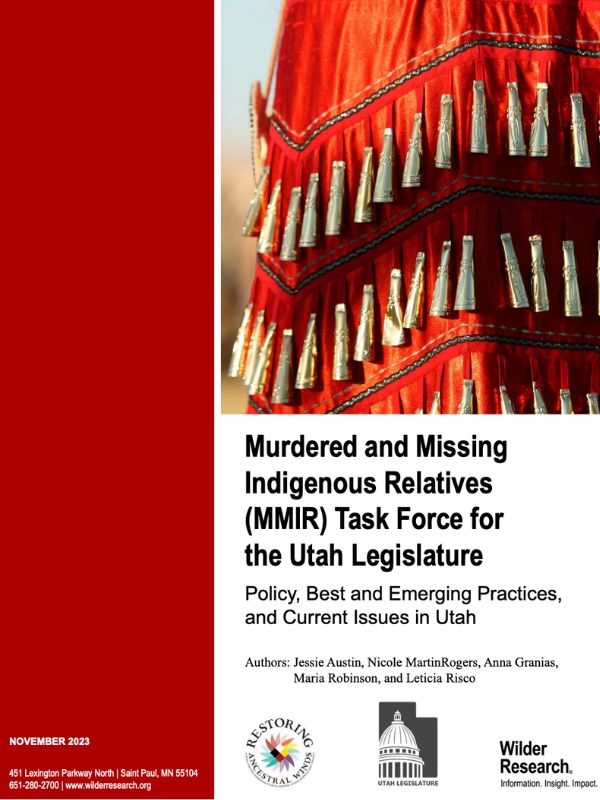
Native Americans in Utah face a disproportionately high risk of violence, murder, or disappearance, constituting over 5% of all murder victims despite making up only 1.5% of the population.
In 2020, the Utah Legislature introduced the MMIR Task Force to address the crisis and explore solutions.
At a press conference held today at the Utah State Capitol Building introducing the report, Hinkins, who co-chairs the MMIR Task Force with Romero, told reporters, “The goal is to not have this happen. We want to ensure our citizens are safe, whether on the reservation or in Salt Lake.”
The 130-page special report released today was compiled by nonprofit and evaluation research group Wilder Research, Native-led advocacy group Restoring Ancestral Winds and a retried FBI missing persons investigator.
Findings result from interviews with key informants and listening sessions with family members of MMIR victims and community members in Utah, an inspection of existing federal and state legislation, and a review of relevant research literature. The report examines the extent of the disparities driving the state’s MMIR crisis and addresses nine key issues, including:
- Reporting and initial investigation of missing person cases
- Communication and alert systems
- Review and investigation of unresolved (“cold”) cases
- Death investigation
- Jurisdiction issues and government-to-government collaboration
- Data issues
- Victim and family services
- Prevention
- Media reporting
As well, the report includes recommendations for addressing the crisis, including creating guidance and model protocols for best law enforcement missing person response policies and procedures across jurisdictions; expanding cold case resources; and increasing access to culturally appropriate victim’s services resources.
Tamra Borchardt-Slayton, Tribal Council Member of the Paiute Indian Tribe of Utah and member of the MMIR Task Force, spoke to the prevalence of the MMIR crisis in Indian Country and the lack of awareness of it outside of Native communities.
“Being a part of this has been a long ride,” Borchardt-Slayton said. “... This epidemic is something that isn’t discussed openly. It isn’t on the front page of every newspaper, and it should be.”
“We need justice for the victims and their families. There are things we deal with in our communities that aren’t often discussed and should be. We all have a story like this. I have a story like this.”
The Utah report comes on the heels of a report issued by the Not Invisible Act Commission urging the federal government to take recommended steps to combat the MMIR crisis nationwide.
More Stories Like This
Q&A: NCAI Presidential Candidates on Two Important IssuesStarbucks Under Scrutiny Over Fictional Symbol in Native American Heritage Month Poster
The 2023 White House Tribal Summit Set for Dec. 6 & 7
National Congress of American Indians 80th Convention Underway in New Orleans
Together, we can educate, enlighten, and empower.
November is celebrated as “Native American Heritage Month.” At Native News Online, we amplify Native voices and share our relatives’ unique perspectives every day of the year. We believe every month should celebrate Native American heritage.If you appreciate our commitment to Native voices and our mission to tell stories that connect us to our roots and inspire understanding and respect, we hope you will consider making a donation this month to support our work. For those who commit to a recurring donation of $12 per month or more, or make a one-time donation of $150 or greater, we're excited to offer you a copy of our upcoming Indian Boarding School publication and access to our quarterly Founder’s Circle meetings and newsletter.
"like this" - Google News
November 15, 2023 at 04:37AM
https://ift.tt/kybTCWV
'We all have a story like this.' | Utah Releases Special MMIR Report - Native News Online
"like this" - Google News
https://ift.tt/RNwDLrz
Shoes Man Tutorial
Pos News Update
Meme Update
Korean Entertainment News
Japan News Update
No comments:
Post a Comment